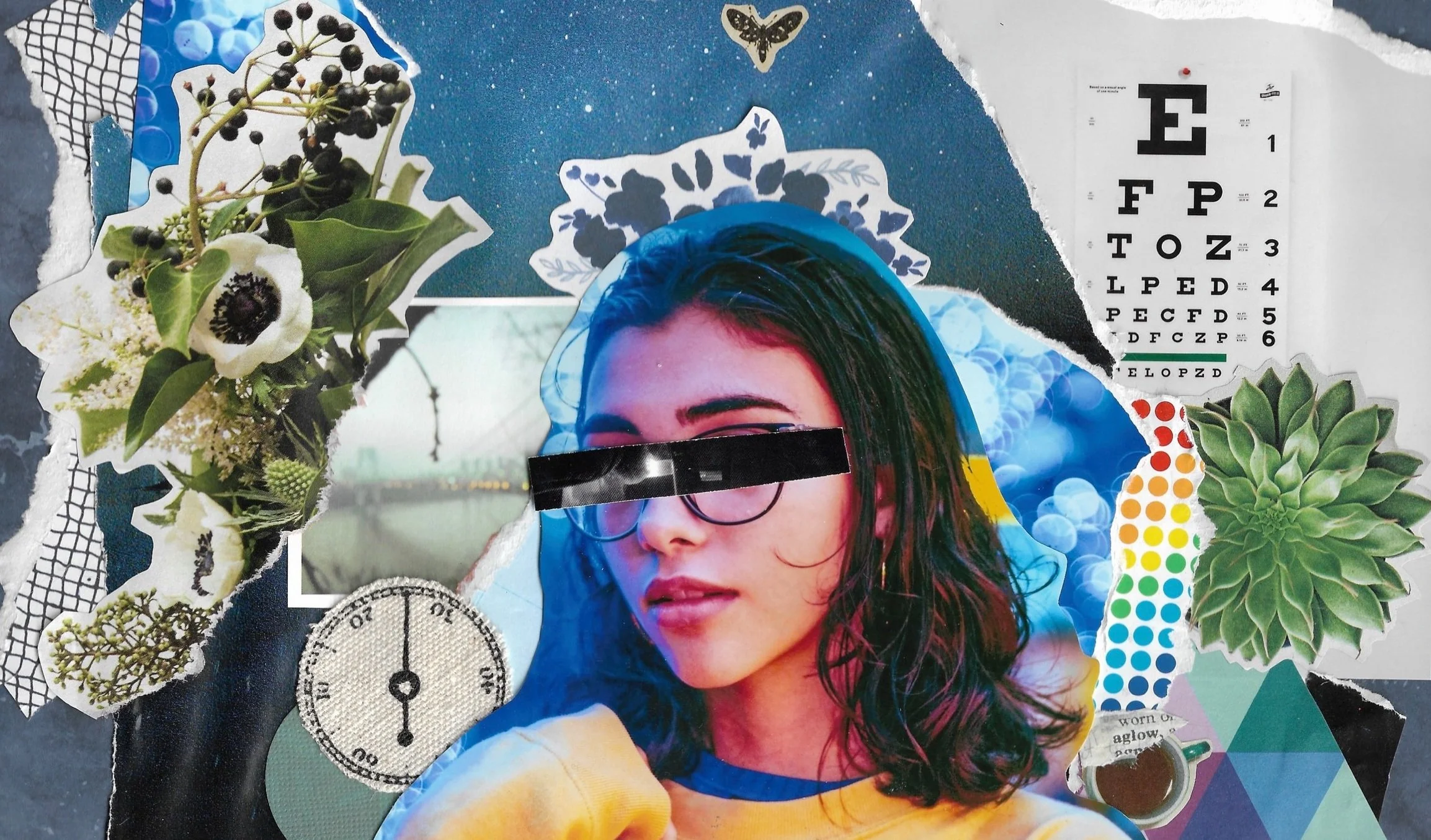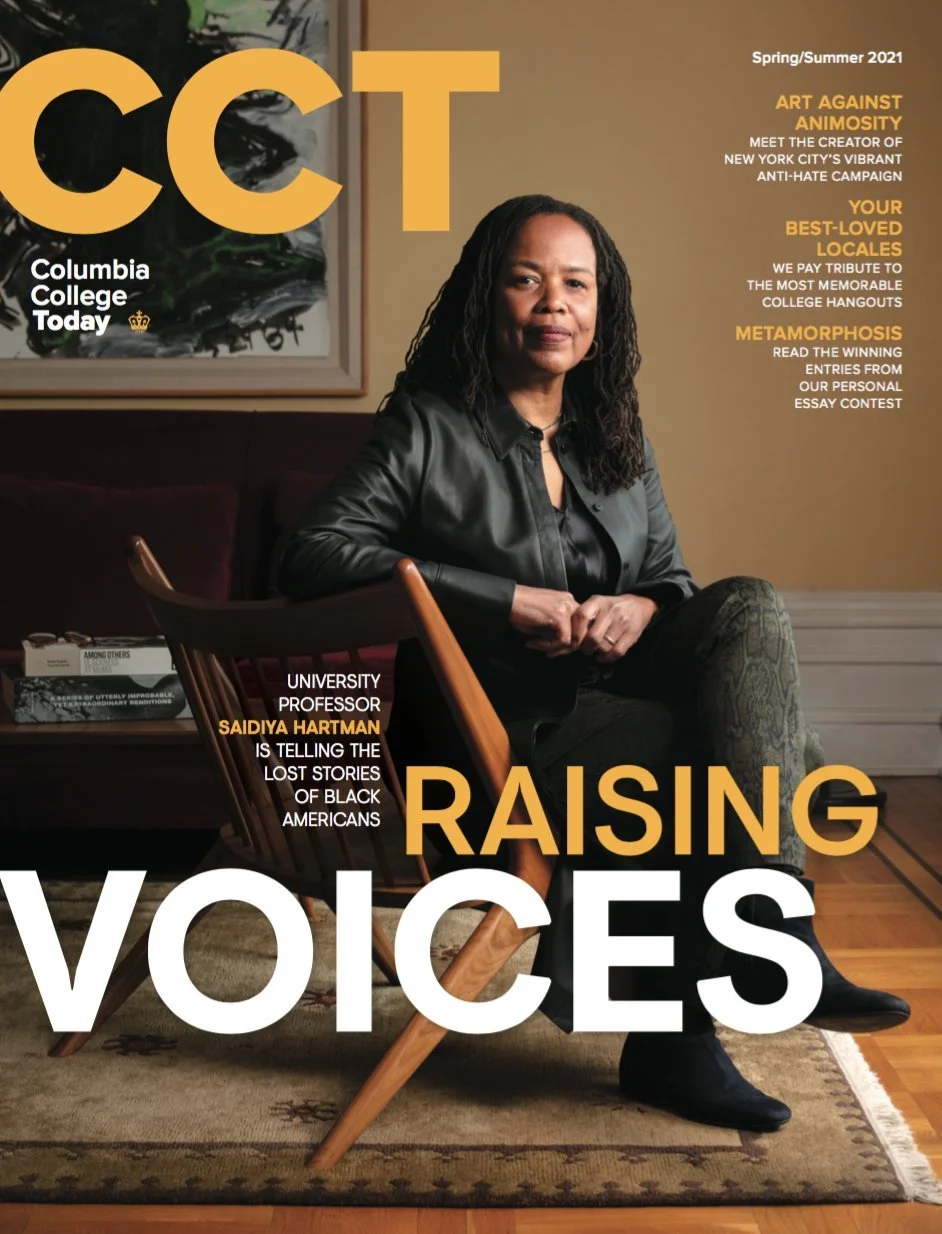Legally Blind
WINNER OF INAUGURAL COLUMBIA ALUMNI ESSAY CONTEST, THEME: “METAMORPHOSIS”, PUBLISHED IN COLUMBIA COLLEGE TODAY, SPRING/SUMMER 2021
ART COLLAGES BY AMANDA TIEN
One hazy August afternoon, golden sun flooding the Virginia backroads to my parents’ house, I realized as I drove that I could no longer read the street signs. I pulled over and held my right palm over one eye, then the other, imitating the optometrist appointments I’d gone to for most of my life. At home, I held my shame and fear all through dinner, then pulled my mom aside and said, “I don’t think I should drive anymore.”
Our optometrist confirmed my vision had degraded significantly, but he didn’t know why. He referred us to an ophthalmologist. We were an Army family; our insurance was limited to military facilities. The nearest one? The (in)famous, depending on who you ask, Walter Reed National Military Medical Center in Bethesda, Md.
My mother drove us on the Capital Beltway, a massive interchange of highway. She swiftly charted the concrete seas out of the woods of northern Virginia, bypassed the stone monument mountains of D.C. and led us to the milky waters of Maryland.
At Walter Reed, we sat on metal chairs with geometric-patterned cushions, waiting long past our appointment time. Polite, quiet soldiers sat nearby, one with dark glasses, another with a thick head bandage. My mother gripped my hand tightly. She pressed play on an iPod audiobook of Pride and Prejudice for me, and I remembered how much I used to love reading for fun. She flipped through a military magazine with articles about moving dogs abroad and making neighborhood casseroles.
When I entered the exam room, the young doctor stared, open-mouthed, for a few awkward moments. I clearly was not who he had expected. We did the classic test; no, I couldn’t read most of the rows. No, not better one, better two. He brought in the attending, a middle-aged woman who shined a bright penlight into my eye. It hurt, searing on a hyper channel to the back of my brain.
She asked, “Did you pour acid in your eye?”
My mom guffawed from the corner.
“Uh, no,” I said, awkward and 19, “I didn’t.”
“Not in chem lab, or something?” he asked.
I shook my head. “I’m not in classes like that. I’m a film major.” They looked at each other and didn’t say anything.
Soon, the room was filled with medical students and doctors. Each one shined the same painful light in my eyes. They clustered in the hallway, whispering. I was relegated to picking up not-great phrases:
“Wow, weird.”
“Her cornea, it’s disintegrating.” (I took AP bio, remembered enough to know this wasn’t good.)
“You sure she wasn’t in an acid attack? Because it looks like it could be an acid attack.”
“She’s in college, not a war zone in the Middle East.” “I don’t know.” “He doesn’t know.” “No one knows.”
I went home with no answers and an appointment for a month later. I would be back at Columbia for my sophomore year by then, unless I took a health leave of absence.
I didn’t want to do that. It wasn’t that bad, I told myself. It would be fine. I would be fine.
I went back to school. It was not fine. As the weeks of fall semester passed, the omnipresent laptop screen burned more and more painfully into my retinas. My headache was constant. The smoke of New York (cigarettes outside campus buildings, blustery gusts from street vendors, a fire drifting its essence over the avenues) was unavoidable and delivered agonizing hazes. One eye worsened faster; my depth perception evaporated. I knocked over cups and cups of coffee. I did fine speaking aloud in Italian class, but when I tried to do my written homework, the language felt even more impossible to parse, my gaze shifting in and out of focus without my control. The beautiful campus I loved was shrouded; I told my mother that it was as if my eyes were becoming panes of frosted glass.
A month later, I took the Amtrak Northeast Regional to D.C. The exam was repeated. The Walter Reed doctors made one statement with assuredness: I was legally blind.
I cried in the car. My mother’s voice was timid with pity. She offered to fill my new prescription at the LensCrafters in the mall — frames from the expensive section, Plexiglass-encased from us dirty-fingered plebes. The glasses themselves were a desperate rope for the sinking ship of my vision.
I envisioned being a blind filmmaker, describing scenes from my imagination. I thought about conversations on colorism I’d had in my work with ethnicity and race studies, how I would literally not see race any more. And when I considered the very real troubles of the world, near and far, I felt guilty for being sad over something as simple and precious to me as my vision.
The fear of a forever night eclipsed every day.
My academic advisor asked, “If this is the last year you can see, what do you want to do with that time?” A childhood dream flashed: novelist. There were fiction workshops at Columbia; Beginning was consistently full, Intermediate required applications. Fear always held me back. I was sure I had missed my chance at ever joining the department. I gently tucked the dream away again.
Professors were supportive. They didn’t comment when I wore the eye patch I bought from Duane Reade. Disability Services gave me a computer program that turned any text into an audiobook, which felt vaguely illegal. I wondered if it was too late in the game to learn Braille.
One day, my mother got a call from Walter Reed; they wanted me to come back.
Again, I took the train, and again, my mother drove. She found small things that made our strange routine special: a kiosk on a floor frequented by nurses who smiled at me and called me pretty; lattes and muffins, banana nut for her, blueberry for me.
This time, we did not wait. This doctor was here to see me.
His office was thoughtfully dimmed. In the soft glow of the vision test projector, I could tell he was graying at the temples. He politely asked where I went to college. When I told him Columbia, he tsk’ed, “That’s not a very good school. Couldn’t you have gotten in somewhere better?”
My mother and I sat in stunned silence until he lifted up a newspaper clipping on his corkboard, revealing his class photo at Cornell. We laughed.
He did not call in any colleagues. He reviewed my records, apologized every time he shined that piercing penlight. The doctor showed me a diagram of my eye, sketched out a conical shape on a piece of legal pad paper. He shared his theory: my eyes were differentiated just enough from the median shape that contacts sat unevenly, roughly wearing at the edges of what unfortunately were the rims of my cornea. This rare phenomenon was called keratoconus.
“I can’t make any promises,” he said kindly. “Maybe in 10 years, if your condition stabilizes, we can get you Lasik to force-correct. But for now, your vision is still decaying. We have to fight it. I have some ideas ....” He inserted colorful rubber toothpicks into my tear ducts and prescribed several types of drops. “You will have to follow a regimented schedule. Can you do that?”
My mother held my hand in her lap. “Amanda is one of the hardest workers I know. She will do what she needs to do.” I felt her strength, copied and pasted it into myself.
Back at Columbia, I carefully made a color-coded map of medications, taped it to the wall of my Hartley dormitory. I set dozens of corresponding, daily alarms. Afraid of failing my doctor, my mother and myself, I took my drops religiously.
For an Italian presentation, I made bruschetta; a roommate helped cut tomatoes so I didn’t slice my fingers off. While my suitemates went to parties, I laid in bed with a compress over my eyes, listening to movies I knew by heart. I took midterms in a private Disabilities cubicle with an extra hour and a computer, because I could type better than I could print. (As a child, I had memorized the QWERTY keyboard, plunking away on the family computer, “writing my stories.”)
I went home to Virginia. On that now-familiar train ride, I realized I could see, for the first time in months, individual birds in trees.
Walter Reed was empty on Thanksgiving; even the little coffee kiosk was closed. Our doctor sat alone in the waiting room, watching the Macy’s Thanksgiving Day Parade, and cheerfully greeted us by name.
He did a vision test; better one, better two.
On his computer, he showed us imaging of my brown eyes, clicked a button that flushed them into aquatic blues and greens, revealing weaving lines that in another world could be rose vines. Scars, he said, all along your eyes, and they will be there forever.
Someday, he told me — softly, seriously — my vision could go again, glazed permanently. He was sorry for that, but was proud of the progress we had made together because, for now, with lenses, I could drive, read a blackboard, go to movies, see birds in trees. He was changing my legal vision status from blind to acceptable.
My mother cried, offered to come back with a pecan pie (hers is excellent), and he joked that would be a great trade for my vision and she threatened she really would and he blushed, said please seriously do not do that.
I returned for the spring semester with clear eyes and reflections about my remaining time at school and on Earth.
I passed all my classes. I made a video game for Contemporary Civilization that culminated in giving a friendship bracelet to Aristotle; my professor sat with me and played through it in one go. “I’m so proud of you,” she whispered. My Italian professor hugged me, encouraged me to stay in touch.
Under the pink blossoms of College Walk, I was aglow from my vision chrysalis.
I left my comfort zone and made an impromptu visit to Kent. For courage, I stopped at the Starr Library on the way up, stared past the long mahogany tables and ferns and books, and up at the stained glass depiction of Justice. Then, onward to the creative writing department. I was offered a cup of coffee by the encouraging department manager. I told her about my dreams but how intimidated I had been; did they offer summer courses? She smiled and waved her hand, as if worries were flies in the wind.
In May, I was accepted to two incredible summer internships: a film agency in Hollywood that would take me on one path, and a children’s literature office at a major publishing house in New York that offered another, alternate route. The latter meant I could take “Beginning Fiction” at Columbia and still qualify for the major. I had a choice.
I stayed in New York. Eight years later, that summer fiction professor wrote my recommendations for an M.F.A. in writing, where I am now. My loss of vision gave me the ability to see time, the most precious resource, and to see selfhood for what it was: the opportunity to choose, every day, who we want to be and what we can do to make that possible.
WINNER OF INAUGURAL COLUMBIA ALUMNI ESSAY CONTEST, THEME: “METAMORPHOSIS”
“Our winners — Amanda Tien ’14 and Munirat Suleiman ’24 — both tell powerful personal stories. Their writing styles differ, but they share a common beauty and bravery. And each of their essays carries extra resonance at this particular moment in our cultural and pandemic life. I’ll let you read on to see why.”
PUBLISHED IN THE SPRING/SUMMER 2021 ISSUE OF COLUMBIA COLLEGE TODAY


